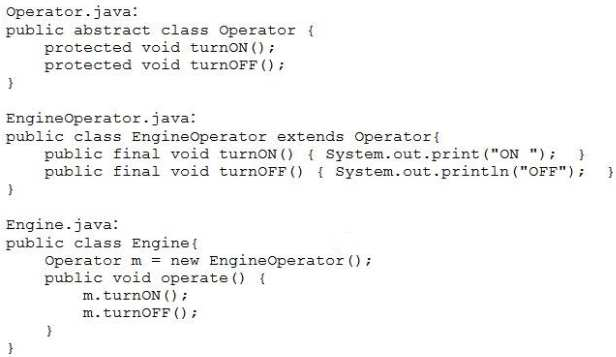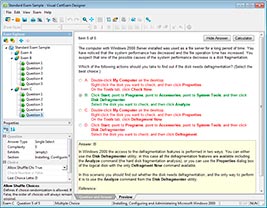Download Java SE 8 Programmer II.1z0-809.BrainDumps.2019-08-12.96q.vcex
| Vendor: | Oracle |
| Exam Code: | 1z0-809 |
| Exam Name: | Java SE 8 Programmer II |
| Date: | Aug 12, 2019 |
| File Size: | 4 MB |
How to open VCEX files?
Files with VCEX extension can be opened by ProfExam Simulator.
Discount: 20%
Demo Questions
Question 1
Given:
class Sum extends RecursiveAction { //line n1
static final int THRESHOLD_SIZE = 3;
int stIndex, lstIndex;
int [ ] data;
public Sum (int [ ]data, int start, int end) {
this.data = data;
this stIndex = start;
this. lstIndex = end;
}
protected void compute ( ) {
int sum = 0;
if (lstIndex – stIndex <= THRESHOLD_SIZE) {
for (int i = stIndex; i < lstIndex; i++) {
sum += data [i];
}
System.out.println(sum);
} else {
new Sum (data, stIndex + THRESHOLD_SIZE, lstIndex).fork( );
new Sum (data, stIndex,
Math.min (lstIndex, stIndex + THRESHOLD_SIZE)
).compute ();
}
}
}
and the code fragment:
ForkJoinPool fjPool = new ForkJoinPool ( );
int data [ ] = {1, 2, 3, 4, 5, 6, 7, 8, 9, 10}
fjPool.invoke (new Sum (data, 0, data.length));
and given that the sum of all integers from 1 to 10 is 55.
Which statement is true?
- The program prints several values that total 55.
- The program prints 55.
- A compilation error occurs at line n1.
- The program prints several values whose sum exceeds 55.
Correct answer: C
Question 2
Given the content of Operator.java, EngineOperator.java, and Engine.java files:

and the code fragment:

What is the result?
- The Engine.java file fails to compile.
- The EngineOperator.java file fails to compile.
- The Operator.java file fails to compile.
- ON OFF
Correct answer: A
Explanation:
Question 3
Given the code fragment:
Stream<List<String>> iStr= Stream.of (
Arrays.asList (“1”, “John”),
Arrays.asList (“2”, null)0;
Stream<<String> nInSt = iStr.flatMapToInt ((x) -> x.stream ());
nInSt.forEach (System.out :: print);
What is the result?
- 1John2null
- 12
- A NullPointerException is thrown at run time.
- A compilation error occurs.
Correct answer: D
Question 4
Given the code fragment:
Path file = Paths.get (“courses.txt”);
// line n1
Assume the courses.txt is accessible.
Which code fragment can be inserted at line n1 to enable the code to print the content of the courses.txt file?
- List<String> fc = Files.list(file);fc.stream().forEach (s - > System.out.println(s));
- Stream<String> fc = Files.readAllLines (file);fc.forEach (s - > System.out.println(s));
- List<String> fc = readAllLines(file);fc.stream().forEach (s - > System.out.println(s));
- Stream<String> fc = Files.lines (file);fc.forEach (s - > System.out.println(s));
Correct answer: D
Question 5
Given the code fragment:
public void recDelete (String dirName) throws IOException {
File [ ] listOfFiles = new File (dirName) .listFiles();
if (listOfFiles ! = null && listOfFiles.length >0) {
for (File aFile : listOfFiles) {
if (aFile.isDirectory ()) {
recDelete (aFile.getAbsolutePath ());
} else {
if (aFile.getName ().endsWith (“.class”))
aFile.delete ();
}
}
}
}
Assume that Projects contains subdirectories that contain .class files and is passed as an argument to the recDelete () method when it is invoked.
What is the result?
- The method deletes all the .class files in the Projects directory and its subdirectories.
- The method deletes the .class files of the Projects directory only.
- The method executes and does not make any changes to the Projects directory.
- The method throws an IOException.
Correct answer: A
Explanation:
Question 6
Given the definition of the Country class:
public class country {
public enum Continent {ASIA, EUROPE}
String name;
Continent region;
public Country (String na, Continent reg) {
name = na, region = reg;
}
public String getName () {return name;}
public Continent getRegion () {return region;}
}
and the code fragment:
List<Country> couList = Arrays.asList (
new Country (“Japan”, Country.Continent.ASIA),
new Country (“Italy”, Country.Continent.EUROPE),
new Country (“Germany”, Country.Continent.EUROPE));
Map<Country.Continent, List<String>> regionNames = couList.stream ()
.collect(Collectors.groupingBy (Country ::getRegion,
Collectors.mapping(Country::getName, Collectors.toList()))));
System.out.println(regionNames);
- {EUROPE = [Italy, Germany], ASIA = [Japan]}
- {ASIA = [Japan], EUROPE = [Italy, Germany]}
- {EUROPE = [Germany, Italy], ASIA = [Japan]}
- {EUROPE = [Germany], EUROPE = [Italy], ASIA = [Japan]}
Correct answer: B
Question 7
Given the code fragment:
Map<Integer, String> books = new TreeMap<>();
books.put (1007, “A”);
books.put (1002, “C”);
books.put (1001, “B”);
books.put (1003, “B”);
System.out.println (books);
What is the result?
- {1007 = A, 1002 = C, 1001 = B, 1003 = B}
- {1001 = B, 1002 = C, 1003 = B, 1007 = A}
- {1002 = C, 1003 = B, 1007 = A}
- {1007 = A, 1001 = B, 1003 = B, 1002 = C}
Correct answer: B
Explanation:
Reference: TreeMap inherits SortedMap and automatically sorts the element's key Reference: TreeMap inherits SortedMap and automatically sorts the element's key
Question 8
Given:
class Book {
int id;
String name;
public Book (int id, String name) {
this.id = id;
this.name = name;
}
public boolean equals (Object obj) { //line n1
boolean output = false;
Book b = (Book) obj;
if (this.name.equals(b name))}
output = true;
}
return output;
}
}
and the code fragment:
Book b1 = new Book (101, “Java Programing”);
Book b2 = new Book (102, “Java Programing”);
System.out.println (b1.equals(b2)); //line n2
Which statement is true?
- The program prints true.
- The program prints false.
- A compilation error occurs. To ensure successful compilation, replace line n1 with:boolean equals (Book obj) {
- A compilation error occurs. To ensure successful compilation, replace line n2 with:System.out.println (b1.equals((Object) b2));
Correct answer: A
Question 9
Given the content of /resourses/Message.properties:
welcome1=”Good day!”
and given the code fragment:
Properties prop = new Properties ();
FileInputStream fis = new FileInputStream (“/resources/Message.properties”);
prop.load(fis);
System.out.println(prop.getProperty(“welcome1”));
System.out.println(prop.getProperty(“welcome2”, “Test”));//line n1
System.out.println(prop.getProperty(“welcome3”));
What is the result?
- Good day!Testfollowed by an Exception stack trace
- Good day!followed by an Exception stack trace
- Good day!Testnull
- A compilation error occurs at line n1.
Correct answer: C
Question 10
Which action can be used to load a database driver by using JDBC3.0?
- Add the driver class to the META-INF/services folder of the JAR file.
- Include the JDBC driver class in a jdbc.properties file.
- Use the java.lang.Class.forName method to load the driver class.
- Use the DriverManager.getDriver method to load the driver class.
Correct answer: C
HOW TO OPEN VCE FILES
Use VCE Exam Simulator to open VCE files

HOW TO OPEN VCEX AND EXAM FILES
Use ProfExam Simulator to open VCEX and EXAM files


ProfExam at a 20% markdown
You have the opportunity to purchase ProfExam at a 20% reduced price
Get Now!



